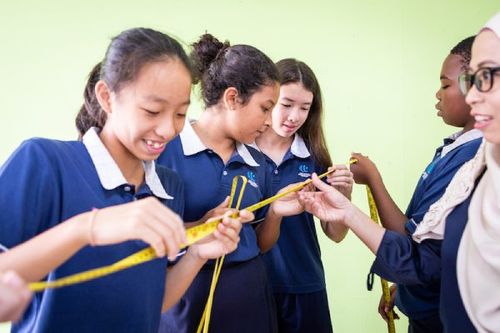At One World International School, we use an inquiry-based approach to learning. This method allows students to delve deeply into topics to develop a broader understanding of them. Inquiry-based learning enables students to apply what they’re learning across a variety of contexts and, ultimately, the real world.
We also emphasise the importance of becoming proficient in an additional language, and we use inquiry to achieve that goal. This gets students actively involved and excited about learning another language. If you’re new to this model, here’s an overview of what it is and what it looks like in our language curriculum at OWIS.
What Is Inquiry-Based Learning?
Traditional approaches to learning place students in a passive role. Teachers present information, give students a series of tasks to complete, then test their knowledge of the material. In contrast, inquiry gives students considerably more autonomy, encouraging them to take the initiative in the learning process.
With inquiry-based learning, teachers do not impart information directly to students. Instead, they act as facilitators. They provide guidance and support according to the ages and developmental levels of their students. But learners are expected to gather and synthesise information to expand their knowledge and concepts. As they do, they learn to apply what they’ve learnt in new contexts, taking increasing responsibility for their learning.
Benefits of Inquiry-Based Learning for a Second Language
This model was initially used in Maths and Science classrooms but also benefits students in second language classrooms. Inquiry enables students to readily build their vocabulary, explore grammatical elements and learn more about cultural nuances within the language. Dynamic learning experiences heighten participation, helping students consistently stay motivated and engaged. Hence, inquiry has a positive impact on all aspects of learning a new language.
This inquiry-led method also provides multiple opportunities for teachers to conduct meaningful, ongoing assessments. They can monitor students’ communication skills to detect patterns of learning, errors and any trouble spots. Teachers can then pose purposeful questions to help students improve their comprehension, communication, and creativity as they hone various cognitive strategies.
How Inquiry-Based Learning Facilitates Language Learning

One of the most significant benefits of inquiry-based learning in second language classrooms is that it sparks learners’ natural curiosity, empowering them to ask questions and find the answers. When presented with a new subject, students ponder three questions.
- What do I already know about this?
- What do I want to know about it?
- What have I learnt about the topic?
Teachers begin with a “big picture” question to get students to discuss and write about what they already know about the subject. In a language class, they might consider how to order food at a restaurant. From there, they consider what they wish to learn about the topic — first in small groups, then as a class. Teachers can guide learners by posing a few questions of their own. After gathering and synthesising information from a variety of sources, students present what they have learnt. They may look at restaurant menus, research how to get to their chosen eatery and calculate meal prices for a group. They can then use their growing language skills to communicate their ideas — both verbally and in writing.
Students may also participate in activities comparing language structures in English and Mandarin. For instance, they might take on the role of a reporter, generating queries to interview their classmates, as they explore how to formulate questions and answers.
Furthermore, with inquiry-led learning, teachers ask questions that require more than a rote response or a “yes/no” answer. This inspires students to “think about what they’re thinking about”. Not only do they give more detailed replies to teachers’ queries, but they’re also more likely to evaluate their progress and set goals accordingly.
How OWIS Makes Use of Inquiry-Based Language Learning
At OWIS, we use inquiry-based learning in our Mandarin lessons. Our approach keeps students at the centre of the learning so they can direct the process. We encourage curiosity and motivation, which are essential for successful learning, especially in younger students.
Our teachers present students with a question or problem that they must resolve through research. Students gain new skills and concepts by responding to this initial challenge. Instead of being passive participants, they are actively engaged in discovery and expanding their cognitive capabilities.
By exploring topics in authentic contexts, students solve problems related to what they encounter in real life. As they examine content through hands-on activities, learners make connections between the classroom and the larger world, which leads to the development of higher-level cognitive skills.
In our Mandarin classrooms at OWIS, learning happens through a logical sequence of stages that involve critical thinking and social interaction. Students can take action and reflect on the consequences of their actions, leading them to discover the dynamics of “learning how to learn”. This makes the content come alive for them as they develop a deeper understanding of it than they would through rote learning. Thus, students see how they can use their language skills outside the classroom, motivating them to develop a higher proficiency in Mandarin. Our inquiry-based approach sets the stage for meaningful learning, giving students a solid foundation for the rest of their school years and beyond.
When students use inquiry to gain skills in a second language, the learning process is highly enjoyable for them. They have the opportunity to participate in hands-on activities, ask questions, conduct research to find the answers and direct their learning. To learn more about how your child can benefit from inquiry-based language learning at OWIS, visit us virtually.
(All OWIS photographs in this blog article were taken pre-Covid. The school is adhering to hygiene protocols and social distancing measures as recommended by the CPE and Ministry of Health, Singapore.)
(This blog was originally written in collaboration with Ms Gu Rui (Grace), former Mandarin Teacher, OWIS Nanyang.)














